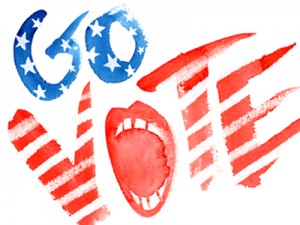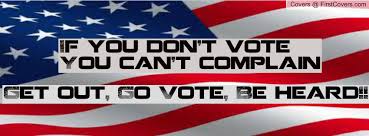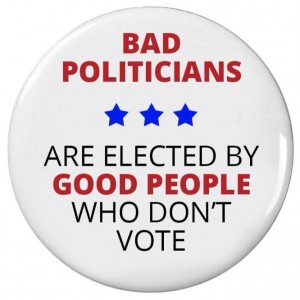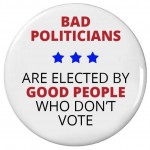 Your vote probably will not matter very much. The people you vote for probably won’t win. In fact, if the people you vote for do win, they will probably turn out to be just as corrupt as the people you voted out. And don’t think for a second that you are going to effect change in your city, county, state, or country by casting a vote on election day. Change doesn’t happen that way. True and lasting changes happens only through lives submitted to Jesus Christ, which is true of very few elected officials, and even if we did elect Christian politicians, it would not be right for them to impose Christian morality on the rest of society like some sort of Christianized Sharia Law.
Your vote probably will not matter very much. The people you vote for probably won’t win. In fact, if the people you vote for do win, they will probably turn out to be just as corrupt as the people you voted out. And don’t think for a second that you are going to effect change in your city, county, state, or country by casting a vote on election day. Change doesn’t happen that way. True and lasting changes happens only through lives submitted to Jesus Christ, which is true of very few elected officials, and even if we did elect Christian politicians, it would not be right for them to impose Christian morality on the rest of society like some sort of Christianized Sharia Law.
Nevertheless, you need to go vote.
Over the past couple years I have read numerous books and articles from various Christian pastors, teachers, and authors who argued that Christians should not vote in elections. They used many of the arguments I used in the opening paragraph above.
And you know what? I do not disagree.
But I still vote. And so should you.
Why?
Because Christians are supposed to be the conscience of culture. We are to be the voice in the wilderness that calls our government to account. We are to raise the banner of peace and love when everybody around us is calling for war, bloodshed, and violence. We are to challenge the political abuse of power, the favoritism shown to the elite, and the partiality shows to the rich. We are to give voice to the weak and powerless, defend the defenseless, and raise awareness to the plight of the poor. We are to stand up for what is right when everybody else is heading toward wrong.
Granted, voting is not going to do any of this. Not really. But you should still go vote.
Why?
Because Christians and churches that do not vote have no right to then turn around and call to account those people who come into power.
In the 2012 Presidential elections, 4 million evangelical Christians did not vote who had voted in the 2008 elections. In 2012, President Obama won the popular vote by just over 3 million votes. I am not saying that all those 4 million evangelical Christians would have voted for Romney. They may not have. (In 2012, 21% of evangelical Christians voted for Obama.)
What I am saying, however, is that if any of those 4 million evangelical Christians who did not vote are unhappy with where our country is today, they have no right to criticize anything our government has done to get us here.
One prominent mid-western pastor encourages the people in his megachurch to forget about voting. He says it’s a form of idolatry. I know this because I listen to his podcast, which probably has tens of thousands of listeners on a weekly basis (maybe more). Yet I occasionally hear him also preach against many of the things our government is involved in, such as wars in the Middle East, the abuse and neglect of the poor in our cities, and the escalating violence of our police force.
While I value and benefit from much that this pastor says, I cannot take him seriously when he starts to call our elected officials to account for their decisions and the directions in which they are taking our country, for in all honesty, this pastor is one reason those officials were elected! He didn’t vote, and he invited everyone who listens to him to refrain from voting as well. If he doesn’t like what these officials are doing, he should have taken advantage of his right to keep them from gaining the power of that office by getting out and voting.

If a Christian did not vote in the last few elections, they can say nothing negative about the $17 Trillion in national debt we have laid upon the shoulders of our children, with the new war in Iraq, with how the numbers of poor people in our country have drastically increased over the past several years, with how Wall Street Bankers have been bailed out while the middle class get pummeled, with how the United States has handled Russia in their aggression with Ukraine, with what decisions the Supreme Court is making regarding gay marriage, with the legalization of marijuana in various states, with the treatment of illegal immigrants in our country, with how the government is handling (or mishandling) our taxes, with how your healthcare premiums are sky rocketing due to Obamacare, with how our cities and states ignore the plight of the homeless, with the rise in frequency of late-term abortions (or any abortion for that matter), or any of the other political and social issues that matter to you.
I am not telling you what your perspective should be on any of these issues, nor am I saying that if Romney had been voted in, much of this would be different. It might not be much different at all.
 All I am saying is that if you did raise your voice by voting, you have no basis on which to raise your voice and criticize the government for the decisions it makes and directions it goes. Voting is not a replacement for being the cultural conscience, but it is the first step in doing so. If you want to call our leaders to account for their actions and decisions, then the first step in having the right to do so is to get out and vote.
All I am saying is that if you did raise your voice by voting, you have no basis on which to raise your voice and criticize the government for the decisions it makes and directions it goes. Voting is not a replacement for being the cultural conscience, but it is the first step in doing so. If you want to call our leaders to account for their actions and decisions, then the first step in having the right to do so is to get out and vote.
Christians must raise our voices for the causes we believe in, and one way (but not the only way!) we can do this in the United States is by going out to vote.
Whenever I hear Christians (or anybody for that matter) complain about the direction of our government, the first question I ask them is, “Did you vote in the last election?” If they say “No,” then I tell them I don’t want to hear their complaints, for they are part of the problem.
If you don’t vote in elections, then don’t complain when elected officials behave badly.
The question is not “To vote or not to vote.” The only real question is “For whom should I vote?”


Why not stop complaining? Sounds like a good option to me as well 😉
I don’t know. Maybe no one should be complaining at all, period. Whether you voted or not. Nor giving anyone the “right” to criticize. The one sounds like sour grapes and never accomplishes anything constructive. The second sounds judgmental. (I speak from experience that I’m not proud of.) Paul says that we, as Christians, are supposed to use prayer to tear down strongholds, and that was probably to further the Kingdom of God and hasten the day of the Lord. His government is the only government, and that’s not it down in Washington. Nor in any other capitol.
Yes, maybe so. Especially when our citizenship is in heaven.
I guess I was just thinking that we are called to call our governments and rulers to account – to be a prophetic voice in our nations – but I think Christians give up this vocation if we refuse to vote.
When the only vote is for the lesser of two evils, I believe the only way to truly be heard is to vote by not voting. I believe not voting IS a vote – it demonstrates I’ve no confidence in the leadership opportunities offered. I won’t vote for a lesser evil, for it is STILL voting for an evil.
Yes, not voting is a vote, but all politicians are “the lesser of two evils” just as there is no pastor or theologians with which you will agree 100%. So sometimes it is best to hold our nose and pull the voting lever for someone who will hopefully stand up for what we believe.
Ballot counting in Zimbabe is more honest than in the United States, because the thugs counting the votes tell the voters that if they vote for the wrong party, their vote will not be counted. In the United States, the computer simply discards votes for the wrong party.
But even if one is regestered to vote, and votes, your choice is:
* The candidate whose objectives are:
# Increase their personal wealth;
# Increase their power to tell you what to do;
# Prevent you from criticizing them;
# Pass legislation that nulifies the Constitution of the United States of America;
# Pass laws that make the activity of people that they hate, a criminal offense, preferably a felony;
* The opposition candidate whose objectives are:
# Nullify the Constitution of the United States of America;
# Pass laws that ensure that more people are convicted of a felony every year;
# Pass laws that enable the state to control your property, without you having any recourse;
# Pass laws that enable the state to control your actions, without you having any legal resource;
# Increase their personal wealth;
Alternativly, one can vote for the candidate that does not exhibit any psychopathology that is described and defined in DSM-5. The problem is, every official elected to office more than twice, suffers from a malady described in that manual. Most individuals that are elected to office _once_, suffer from a malady defined and described therein, severe enough to warrant treatment for it.
Yes, most politicians suffer from this malady. This is why I try to vote for those politicians who say that smaller government is better. No system is perfect, and I put no trust in human leaders.
Count the number of politicians who said that they would only seek re-election for one term if they won the election they were running in. Then count the number of those who won that election, and went on to serve another three or more terms.
It isn’t enough for the politician to claim to want smaller government. S/he needs to have a plan to reduce the size of government, and slash all of the services that are performed only by those with illegitimate power.
The first department to be elimianted would be the local law enforcement, becuase it is a violation of the flaw of the land that ovewrarches all other law, for any law enforcement agency to investigate an act against a private individual, or their property, or their effects. (That means that both 911 call centers, and local polcie are legally prohibited from responding to a rape in progress, or a mass shooting of people, and likewise legallyprohibited from investigating those crimes.)
Now, if a politican won’t force the government body that s/he is elected to, to adhere to the law of the land — a law that overshadows, and controls all other laws rules, and regulation in effect — then I have no reason to believe that the politican will do anything that s/he claims, Have you ever seen a politican that wanted smaller government be willing to mention the reduction in size of local law enforcement, much less the elimination of said agency?
Many politicians say they want smaller government, though few are able to accomplish it. As you say, we cannot trust most politicians.
Your vote does not count, the election is completely rigged, and there are a handful of people running the country and the election is just to give the appearance of a republic. It is also to put a figurehead into place to comfort the people of the country.
Agreed, Amen Jeremy!
Holy Triple-Effing-Tautology, Batman. Sheesh.
Jeremy. You are smart, insightful, and incisive.
But not in this post. In this post you sound like some pastor, somewhere.
Love You with the Love of Christ my Brother.
If you disagree, at least state why. Sheesh.
Simply because it does-not-follow that those who do not vote somehow forfeit their right to criticize the government or a given policy.
Simply because we are Ambassadors and aliens here, not citizens. Only citizens vote, foreign Ambassadors do not. We sojurn as if in tents in this strange land.
Not participating in the voting process is itself a vote. And, who are you to judge non-voters? Do you judge by a Godly standard, or a human one?
Additionally, your “argument” appears to be, “You should vote because it is good to vote”.
http://en.wikipedia.org/wiki/Tautology_%28rhetoric%29
So you want to raise your voice in disagreement with various policies of the government, but you don’t want to raise your voice in deciding who makes the decisions about those policies?
I completely agree that not participating in the vote is itself a vote. It is a vote for whomever wins. Therefore, if you don’t like the people in office or what they are deciding, you cannot criticize them because you helped put them there. And, who are you to judge voters? Do you judge by a Godly standard, or a human one?
Your “argument” appears to be “I want to have my cake and eat it too.”
I don’t like cake.
My position is this: I feel as if I do not have the right to vote, as my citizenship is in heaven. However, these folks tell me I have the right to vote as I am a citizen of the U.S. So, I vote, prayerfully, praying for whomever wins, but voting with the best interests of these fellow citizens (and myself, when possible) in mind. And, I suppose, if Christ or His LORD have any issue with my management of the issue They will raise it to my attention in the resurrection.
I agree with you 100% on this. Even about the cake! ha!